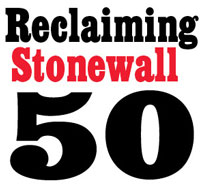 “She goes by what?” I couldn’t wrap my head around it.
“She goes by what?” I couldn’t wrap my head around it.
“They,” my colleague clarified, “identify as a pansexual demiboy with they/them pronouns.” We were discussing our LGBTQ students, and my colleague had just mentioned his ninth grader, a student we’ll call Skylar.
We had talked about Skylar before. They are the bashful one with dark-rimmed glasses and an otaku-level knowledge of pride symbols. They once crayoned several trans and nonbinary flags on index cards to display in the classroom—for “full representation and inclusion.”
To be clear, I think nonbinary expressions of gender and sexuality have always existed, but even as a gay millennial and educator, I admittedly struggle to keep up with our evolving conversations on LGBTQ identity.
At my best, I try to learn about these cultural changes made apparent to me by my students. I do my research to understand how they respond to larger narratives in our diverse LGBTQ history and accept them for what they are. At my worst, I have secretly wondered if these expressions are just a trendy Tumblr Thing. (They’re not).
As an adult who works with young people, I think our first instinct is to double down on the status quo and to write off whatever seems new or different as a quirk of the younger generation. There’s a cruel temptation to overlook our own biases and to dismiss what is unfamiliar or different, as my father once did when I came out as gay at fifteen: “You go by what?”
But the 50th anniversary of Stonewall compels me to shut up and listen—to check my ignorance so I can fully embrace the truth, voices and journeys of trans and gender-nonconforming (GNC) students like Skylar and to reflect on the lopsided gains made in the LGBTQ movement in general.
Progress for cisgender gay, lesbian and bisexual folks has historically come at the expense of trans erasure. In our fight for acceptance and inclusion, cis queer activists have, at times, made painful compromises on trans issues, leaving matters of trans survival secondary to more mainstream battles like marriage equality. Not only does our society still place the validity of trans identities up for a debate, but trans people—especially those of color—continue to experience higher rates of homelessness, discrimination, and hate-motived violence and murder.
Stonewall is a bittersweet reminder that I, as a gay cisgender male, have the privilege to navigate a society that has started to embrace my existence and humanity, while still largely ignoring those that of my trans/GNC students; that the increasing tolerance afforded to people like me can exist despite their continued oppression.
In the United States, only 21 states recognize gender identity as a protected class in their schools. What this means is that the majority of districts have no legal obligation to protect and affirm their transgender/GNC students, whether that means providing accommodations consistent with their gender identity or eliminating practices like restrictive dress codes that limit gender expression and can cause them undue harm. In this context, it’s not surprising that our trans/GNC youth not only report higher incidences of bullying and harassment, but are more likely to miss or drop out of schools than their non-LGBTQ peers. In addition to the alarming frequency of mental health risks and suicide among our transgender youth, our schools are failing in their mandate to teach and support all children.
As a gay educator, I have an obligation to advocate full LGBTQ liberation and justice, and this means centering conversations on the experiences on our most vulnerable members—who also happen to have helped paved the way for our visibility today.
I’m called upon to fight as an ally for my trans/GNC students and to create a school culture that unapologetically supports them. From simple practices, like affirming the chosen name and pronouns of our students, to systems-level changes that fight for trans inclusive curricula and gender-neutral bathrooms, all educators have the responsibility to confront their complicity in the systemic marginalization of trans/GNC students.
So whether gay or straight, when our impulse kicks in to question our young people—especially on issues related to sexuality and gender identity—our mandate is to love and live in solidarity.
And instead of interrogating them on what they go by, we focus on asking them how we go with.


